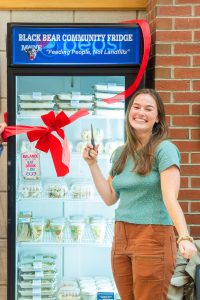Kate Flynn: Turning leftovers into long-lasting impact

In the United States, more than 133 billion pounds of food are thrown away each year. According to the Environmental Protection Agency, food waste is responsible for 33% of total greenhouse gas emissions in Maine, and about 11% of emissions nationwide.
Kate Flynn, a fourth-year political science student at the University of Maine, was exposed to the extent of food waste across the state and nation during a class project that dealt with nutrition insecurity and the redirection of excess food to where it is needed most. Her project inspired her passion for making a difference in how people can access food.
“We like to frame it as connecting excess or surplus food to where food is needed because frequently, the phrase ‘food waste’ has a negative connotation. It is ‘wasted food,’ because the majority of food waste is perfectly good and edible food that is falling through the cracks of our food access system,” said Flynn.
In 2022, Flynn applied for an internship with the Senator George J. Mitchell Center for Sustainability Solutions’ Food Rescue MAINE food waste solutions research program. Flynn’s research focus was developing food waste solutions that would help to feed more Mainers.
Working with various stakeholders, including the Black Bear Exchange, Sodexo/UMaine Dining, Maine Hunger Dialogue, the Wilson Center, Black Bear Mutual Aid group, UMaine Green Team and other hunger and food waste focused organizations, Flynn launched a community fridge pilot on the UMaine campus. The Black Bear Community Fridge & Pantry officially opened in November 2023.
“We wanted to not just decrease the stigma around asking for help and getting help with food, but also make food more accessible,” Flynn said. “The fridge is meant for everyone. The Black Bear Exchange food pantry also does incredible work for UMaine students and the greater Orono area.”
